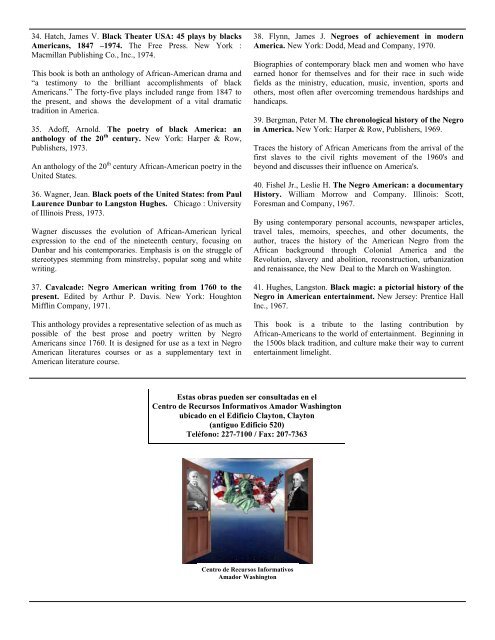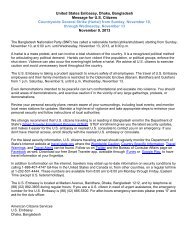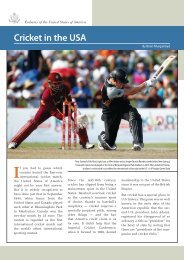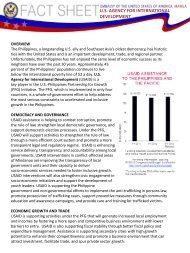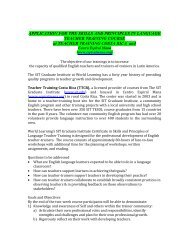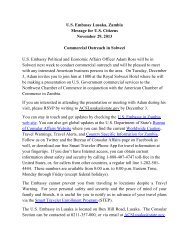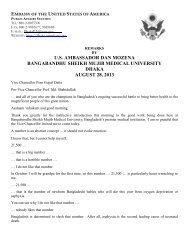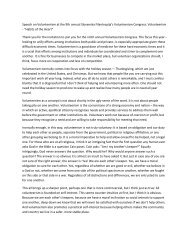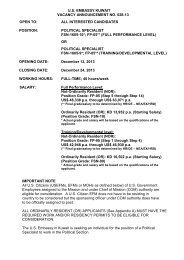Mes de la Herencia Afroamericana
Mes de la Herencia Afroamericana
Mes de la Herencia Afroamericana
Create successful ePaper yourself
Turn your PDF publications into a flip-book with our unique Google optimized e-Paper software.
34. Hatch, James V. B<strong>la</strong>ck Theater USA: 45 p<strong>la</strong>ys by b<strong>la</strong>cks<br />
Americans, 1847 –1974. The Free Press. New York :<br />
Macmil<strong>la</strong>n Publishing Co., Inc., 1974.<br />
This book is both an anthology of African-American drama and<br />
“a testimony to the brilliant accomplishments of b<strong>la</strong>ck<br />
Americans.” The forty-five p<strong>la</strong>ys inclu<strong>de</strong>d range from 1847 to<br />
the present, and shows the <strong>de</strong>velopment of a vital dramatic<br />
tradition in America.<br />
35. Adoff, Arnold. The poetry of b<strong>la</strong>ck America: an<br />
anthology of the 20 th century. New York: Harper & Row,<br />
Publishers, 1973.<br />
An anthology of the 20 th century African-American poetry in the<br />
United States.<br />
36. Wagner, Jean. B<strong>la</strong>ck poets of the United States: from Paul<br />
Laurence Dunbar to Langston Hughes. Chicago : University<br />
of Illinois Press, 1973.<br />
Wagner discusses the evolution of African-American lyrical<br />
expression to the end of the nineteenth century, focusing on<br />
Dunbar and his contemporaries. Emphasis is on the struggle of<br />
stereotypes stemming from minstrelsy, popu<strong>la</strong>r song and white<br />
writing.<br />
37. Cavalca<strong>de</strong>: Negro American writing from 1760 to the<br />
present. Edited by Arthur P. Davis. New York: Houghton<br />
Mifflin Company, 1971.<br />
This anthology provi<strong>de</strong>s a representative selection of as much as<br />
possible of the best prose and poetry written by Negro<br />
Americans since 1760. It is <strong>de</strong>signed for use as a text in Negro<br />
American literatures courses or as a supplementary text in<br />
American literature course.<br />
Estas obras pue<strong>de</strong>n ser consultadas en el<br />
Centro <strong>de</strong> Recursos Informativos Amador Washington<br />
ubicado en el Edificio C<strong>la</strong>yton, C<strong>la</strong>yton<br />
(antiguo Edificio 520)<br />
Teléfono: 227-7100 / Fax: 207-7363<br />
Centro <strong>de</strong> Recursos Informativos<br />
Amador Washington<br />
38. Flynn, James J. Negroes of achievement in mo<strong>de</strong>rn<br />
America. New York: Dodd, Mead and Company, 1970.<br />
Biographies of contemporary b<strong>la</strong>ck men and women who have<br />
earned honor for themselves and for their race in such wi<strong>de</strong><br />
fields as the ministry, education, music, invention, sports and<br />
others, most often after overcoming tremendous hardships and<br />
handicaps.<br />
39. Bergman, Peter M. The chronological history of the Negro<br />
in America. New York: Harper & Row, Publishers, 1969.<br />
Traces the history of African Americans from the arrival of the<br />
first s<strong>la</strong>ves to the civil rights movement of the 1960's and<br />
beyond and discusses their influence on America's.<br />
40. Fishel Jr., Leslie H. The Negro American: a documentary<br />
History. William Morrow and Company. Illinois: Scott,<br />
Foresman and Company, 1967.<br />
By using contemporary personal accounts, newspaper articles,<br />
travel tales, memoirs, speeches, and other documents, the<br />
author, traces the history of the American Negro from the<br />
African background through Colonial America and the<br />
Revolution, s<strong>la</strong>very and abolition, reconstruction, urbanization<br />
and renaissance, the New Deal to the March on Washington.<br />
41. Hughes, Langston. B<strong>la</strong>ck magic: a pictorial history of the<br />
Negro in American entertainment. New Jersey: Prentice Hall<br />
Inc., 1967.<br />
This book is a tribute to the <strong>la</strong>sting contribution by<br />
African-Americans to the world of entertainment. Beginning in<br />
the 1500s b<strong>la</strong>ck tradition, and culture make their way to current<br />
entertainment limelight.


